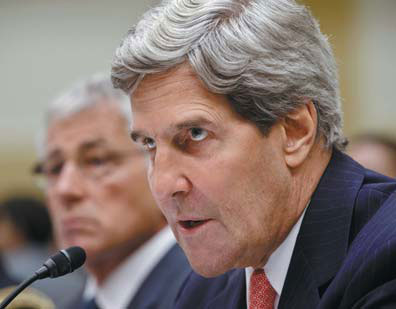Kerry at odds with intelligence on rebels
US Secretary of State John Kerry's public assertions that moderate Syrian opposition groups are growing in influence appear to be at odds with estimates by US and European intelligence sources and nongovernmental experts, who say Islamic extremists remain by far the fiercest and best-organized rebel elements.
At congressional hearings this week, while making the case for US President Barack Obama's plan for limited military action in Syria, Kerry said of the armed opposition to Syrian President Bashar al-Assad: "The opposition has increasingly become more defined by its moderation, more defined by the breadth of its membership, and more defined by its adherence to some, you know, democratic process and to an all-inclusive, minority-protecting constitution, which will be broad-based and secular with respect to the future of Syria."
US and allied intelligence sources and private experts on the Syrian conflict suggest that assessment is optimistic.
While the radical Islamists among the rebels may not be numerically superior to more moderate fighters, they say, Islamist groups such as the al-Qaida-aligned Nusra Front are better organized, armed and trained.
Kerry's remarks represented a change in tone by the Obama administration, which for more than two years has been wary of sending US arms to the rebels, citing fears they could fall into radical Islamists' hands.
As recently as late July, at a security conference in Aspen, Colorado, the deputy director of the Pentagon's Defense Intelligence Agency, David Shedd, estimated that there were at least 1,200 different Syrian rebel groups and that Islamic extremists, notably the Nusra Front, were well-placed to expand their influence.
"Left unchecked, I'm very concerned that the most radical elements will take over larger segments" of the opposition groups, Shedd said. He added that the conflict could drag on anywhere "from many, many months to multiple years" and that a prolonged stalemate could leave open parts of Syria to potential control by radical fighters.
US and allied intelligence sources said that such assessments have not changed.
A spokeswoman at the State Department said Kerry's remarks reflect the department's position, adding that the opposition had "taken steps over the past months to coalesce, including electing leaders".
Experts agree that the Nusra Front, an offshoot of al-Qaida in Iraq, is among the most effective forces in Syria.
In a second hearing on Wednesday, Kerry was challenged by Republican congressman Michael McCaul.
"Who are the rebel forces? Who are they? I ask that in my briefings all the time," McCaul said. "And every time I get briefed on this it gets worse and worse because the majority now of these rebel forces - and I say majority now - are radical Islamists pouring in from all over the world."
Kerry replied: "I just don't agree that a majority are al-Qaida and the bad guys. That's not true. There are about 70,000 to 100,000 oppositionists. ... Maybe 15 percent to 25 percent might be in one group or another who are what we would deem to be bad guys.
"There is a real moderate opposition that exists. General Idriss is running the military arm of that," Kerry continued, referring to General Salim Idriss, head of the rebel Free Syrian Army.
Increasingly, he said, Saudi Arabia and other states bordering the Persian Gulf are funneling assistance through Idriss.
Reuters
|
Secretary of State John Kerry, accompanied by Defense Secretary Chuck Hagel (left) testifies on Capitol Hill in Washington, on Wednesday to advance President Barack Obama's request for military intervention in Syria. J. Scott Applewhite / Associated Press |
(China Daily 09/06/2013 page12)









